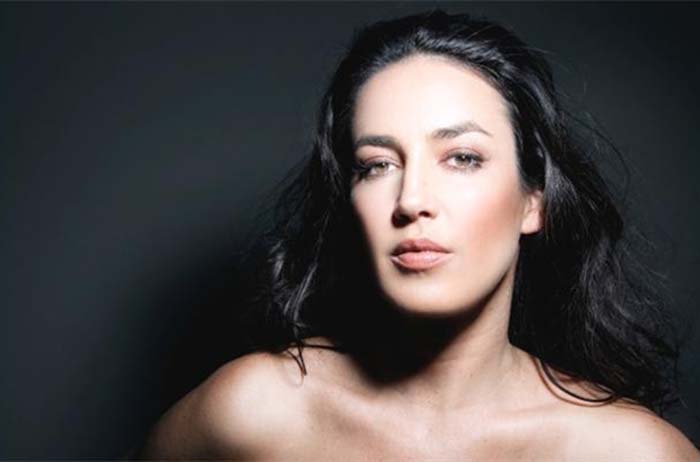Kinnie Starr: Home is everywhere. Juno-nominated artist takes fringe cultures to the cutting edge.
By Francois Marchand, Vancouver Sun, July 26, 2013
Kinnie Starr
Aug. 2, 7:30 p.m. | Roundhouse Performance Centre
Tickets: $5 (youth), $20 (adult) in advance at queerartsfestival.com
For Kinnie Starr, it’s a portable life.
Whether in Penetanguishene, where she has been caring for her father, or Vancouver (where she lives) or somewhere in between, the Juno-nominated artist is finding her roots by being rootless, and it’s a theme that comes across quite clearly on her latest album Kiss It, out in August.
“I wanted to call the record ‘Home Is Everywhere’ (the title of the album’s leadoff track) because I made this record by myself with my computer, a guitar, a keyboard and some drums,” Starr said in a recent phone interview. “My portability influences my art.
“It really strikes me the more mature I become as an artist, the more I study my craft, that the ability to make art in quiet places and to take your art with you where you go is major gift. It’s really amazing to find roots wherever you are and to think, ‘I belong here.’”
After thumbing her nose at laptop culture and electro influences with her guitar-centric, Chin Injeti-produced album A Different Day (2010), Kiss It sees Starr return to her hip-hop foundation with a self-produced album that is entirely hers.
Kiss It is a big, brash statement on art, nature, gender identity, sexuality and the politics tied within all of them.
It’s not surprising then to see her premiere her new album at this year’s Queer Arts Festival, an event whose theme —and main art exhibit, curated by Paul Wong — is “TransgressionNow.” (Note: Although the festival runs as the same time as Pride, the two are not officially connected.)
“Queer cultures are leading cultures,” Starr said. “Native culture is the same way — women’s culture as well. Any kind of fringe culture can see from the outside in. I feel like I owe a lot to the queer community for developing my career. When I first started making music I came out of visual arts, making this guerrilla street art and queer-positive art. That lesbian community and feminist community was built into what I did.
“I have an allegiance to the queer community also because I’ve been in love with women,” she added. Currently married to a man, actor Stuart Pierre, Starr has been vocal about her bisexuality in the past. “I know what it feels like to be afraid to kiss my girlfriend in a parking lot because I don’t want my teeth knocked out. It’s not that way in 2013 any more because it’s popularized and more accepted.”
Kiss It will be included in the price of admission for all that go see her performance on Aug. 2, almost three weeks ahead of its official release on Aug. 18.
The concert at the Roundhouse Community Centre will also feature cellist Cris Derksen and Starr associate and Sto:lo DJ Ostwelve manning the decks.
Kiss It’s album cover, which features a naked Starr clutching a rifle while lounging on a couch in her old family cottage with her back to the camera, is a strong statement about the human body and about natural beauty as art.
But more than anything, Kiss It, in all its raw, ragged electro hip-hop glory, is also a testament to Starr’s cultural heritage (which includes Aboriginal roots), and a salute to parents who have always been much more conservative than she is.
“My mom has said to me several times recently that she feels so lucky to know someone like me because I’m the only person she knows that thinks way ahead of the curve, whether it was nutrition or gay rights or native rights,” Starr said. “I think whatever reservation my parents once had about me as an artist have been dispelled by seeing my concerns now part of current media.
“I feel a lot of responsibility,” she said when asked if it was strange to suddenly see herself as a role model for her own parents. “My father is an alcoholic and an addict and that’s why I was (in Penetanguishene) for two years. I wish I could do more to help him. I just feel proud that I was able to put that time into my father and my mother and be there for my family. I’m really happy (about being a role model to them). I’m kind of a fringe thinker and I’ve been that way since I was a kid. Finally as an adult I’m able to articulate that stuff to my parents.”
Starr said she was not one to sit idly in front of the TV as a kid, always looking for something to do or a place to go, memories that pepper a song like We Just Want To Play.
Body Like A Queen, the album’s leadoff single, sees Starr take a stand against what she deems to be the pervasive, corrupted view of the female body that is perpetuated in the media and skews our understanding of what the human machine really is.
But while she makes a strong stand on Kiss It, expressing opinions she said she fears may clash with hip-hop’s mostly male audiences, she ultimately hopes for people to feel “joy and contemplation.”
“We are all looking for the same thing: Love, acceptance, some harmony in our personal lives,” Starr said. “But we’re so f—ed right now because of media culture and music video culture. I try to listen to music without looking at videos and I think that we would all have so much more fun if we didn’t stare at computer screens all the time.”

